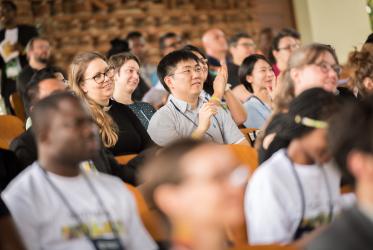Religion is a double-edged sword for women healing from violence and trauma, say two scholars whose work investigates and analyses the area.
Dr Susan St. Ville teaches in and directs the master’s programme at the Joan B. Kroc Institute for International Peace Studies at the University of Notre Dame, U.S.A., while Dr Zilka Spahic Siljak, a Bosnian scholar, serves currently as a visiting lecturer in Women’s Studies and Islamic Studies at Harvard Divinity School.
The two theologians visited the Ecumenical Centre while facilitating the week-long workshop on “Women’s Pilgrimage of Justice and Peace—Inspired by UNSR1325,” sponsored by the Ecumenical Institute Bossey, the educational engine of the World Council of Churches (WCC).
The seminar was developed by the WCC programme Just Community of Women and Men (formerly Women in Church and Society) led by Dr Fulata Lusungu Moyo, programme executive, and focussed on making accessible UNSCR1325 to religious women.
UNSR1325 is the UN Security Council resolution that mandates focus on and involvement of women in post-conflict arrangements for peace-building and reconstruction, a key asset for developing or restoring gender justice in war-torn areas that have witnessed large-scale gender violence.
Religion: friend or foe of women?
While recent Gallup Polls, for example, still demonstrate the ongoing influence and authority of religion in people’s lives, says Siljak, it varies wildly in different contexts. In post-socialist regimes of Eastern Europe and during the Bosnian war, for example, religious institutions and church bodies proved not helpful to women. “Religion is not helpful if politicized or manipulated” as a tool of nationalism, she said. “But personal religion was helpful for women who had been victimized by violence as a means of coping with trauma and moving on to reconstruct their lives.” In the end, she said, their faith in God can help women heal.
Against a backdrop of institutional indifference, Siljak noted, women have created “alternative spaces” and faith-based organizations to address their concerns. Ironically, she said, the work of secular organizations can sometimes provide a platform for and impetus to religious women to organize.
Still, in many contexts “churches have been real resources for resilience,” said St. Ville, citing work in East Africa, particularly Uganda, where she has seen religious women create effective programmes for counselling and post-trauma life-support for women after 20 years of war.
Practice trumps and validates theory
Although at the forefront of recognizing and engaging diversity and the role of practice, feminist theory and theology still struggle for legitimacy in academic settings and are often seen as too abstract, both scholars affirmed.
“The WCC functions well as a partner in this dialogue” between theory and practice, said Siljak, since it provides access to a global infrastructure of women active in religious settings around the world, both individually and in powerful movements on the ground. “Women’s movements are feminist theory in practice,” said St. Ville, and theologians can “use the great religious infrastructure” to inform their theologies and support real change. To stay relevant, she said, theologians “should not allow theories to discount practice.”
Frontiers of feminist reflection
After a generation of pioneering feminist theology and historical work, and of feminist theory, where is the feminist engagement with religion headed?
Siljak finds inspiration in on-the-ground women’s movements, especially in Roman Catholic communities of women religious and in Islamic communities. There she witnesses women working with, through, and around religious traditions to find affirmation, respect, and authority. In nonreligious NGOs, too, Siljak experiences helpful inter-religious encounters of Christian, Muslim and Jewish women.
For St. Ville, the feminist quest still centres around the question, “How do women get agency?” whether in situations of violence and trauma, in creating movements for social change, or in the academic disciplines.
Although for post-trauma women “the theodicy question is huge,” she marvels at how, despite the checkered legacy of faith communities in relation to women, “People find their way through it in different ways, through their personal faith journeys.” Attending to how women actually cope as individuals and in movements, she says, is the privileged site of new learning, because “People find their way out of pain in amazing ways.”








